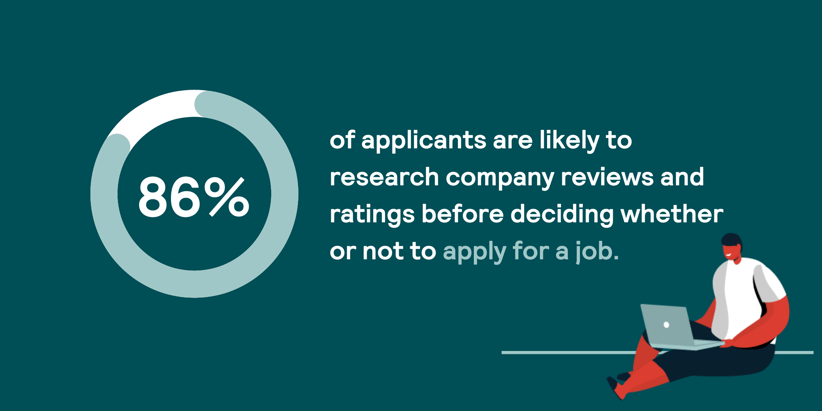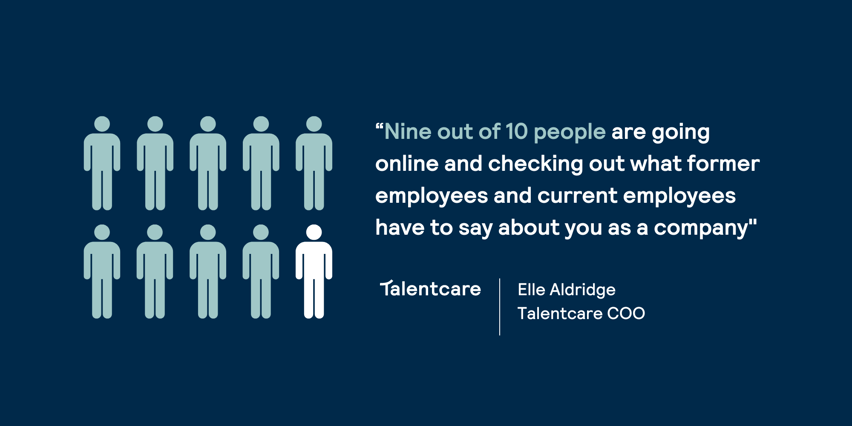You’re not getting enough applicants for your open positions. Experienced employees are leaving because you’re short staffed and they’re burned out. There’s a talent shortage. It’s a candidate’s market. No one wants to work. In other words, it’s not us, it’s them. Except…it just might be you. Or more specifically, your company’s reputation as an employer.
Gartner defines reputation management as “the practice of influencing stakeholder perceptions and public conversations about an organization and its brands. It includes monitoring perceptions and conversations, responding to reputation threats and proactively seizing opportunities to boost reputation.”
So how do candidates find out about your reputation as an employer? Some through word of mouth, but the vast majority of job seekers will visit employer review sites like Glassdoor. In fact, a whopping 86% of applicants are likely to research company reviews and ratings before deciding whether or not to apply for a job. Potential applicants are also three times more likely to trust employee reviews over statements made in an actual job posting. (source: Glassdoor/Harris Poll, Sept. 2019, US).

Many companies choose to ignore reviews, either because they don’t think it’s necessary or because they dismiss negative reviews as coming from disgruntled former employees (or disgruntled current employees). And that’s the heart of it: Every company has at least one disgruntled employee, some have many, and many employees are disgruntled for a reason.
Regardless, job seekers will still read your reviews on employer review sites.
Talentcare COO, Elle Aldridge, says that “Nine out of 10 people are going online and checking out what former employees and current employees have to say about you as a company. So if your rating is below a 3.5, if you’re not responding to all of the reviews that somebody is leaving, the likelihood is that you’re just not getting enough candidates because people are choosing not to apply.”

How Employee Reviews Impact Your Ability to Attract the Right Candidates
Put yourself in the shoes of a job seeker. You find a job posting that sounds perfect, but you’re not familiar with the company. Open a new tab, search “employee reviews company name.” Yikes. Close tab and continue searching.
ONE: Broadly, if we may state the obvious, negative reviews may lead to a lower number of applications…who woulda thought?!
TWO: Less obvious, they can also impact candidate quality. Consider the job seeker who reads a company’s reviews that include things like “toxic work environment” or “micromanagers” – and they shrug and apply anyway. If those things don’t matter to them when they’re seeking a job, they won’t matter once they’re on the job and may in fact be more likely to foster a similar environment (yes, the one you’re working so hard internally to change).
 Related article: 7 Sites to Monitor Your Employer Reputation
Related article: 7 Sites to Monitor Your Employer Reputation
THREE: A reduction in offer acceptance rates after application. OK, so some job seekers will apply to open jobs without looking at your reviews first. But when there’s an offer on the table, they just might do a quick search to see if they’re really making a good decision. Negative reviews? And they nope out.
FOUR: You’re asking for employee referrals and you’re getting crickets. Fun fact: Your current employees leave reviews too. And they work for you. If disengaged employees are disengaged for a good reason, why would they want to bring friends or former colleagues into the mix?
In our current talent marketplace, can we afford to ignore reviews? Definitely not. But since we can’t have them removed from the internet, we need a reputation management strategy. That’s a big part of what we do at Talentcare and we’re ready to help. Drop us a line or slide into our DMs.
